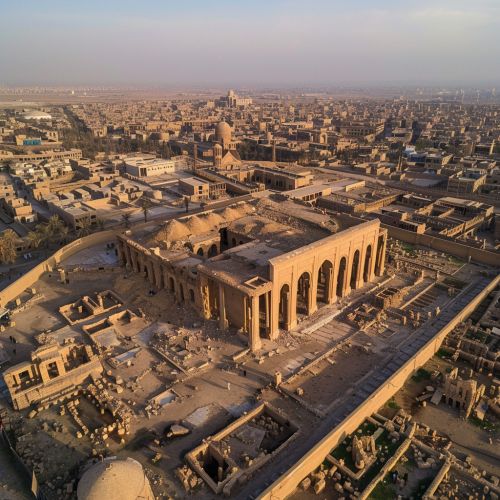Baghdad
History
Baghdad has a rich and complex history that dates back to ancient times. The city was founded in the 8th century by the Abbasid Caliphate and quickly became a significant center of the Islamic Golden Age. The Abbasids built the city with a round plan, a design that was unique for its time. The city's circular layout was intended to symbolize the unity of the Islamic world.


During the Middle Ages, Baghdad was one of the largest cities in the world and a thriving center of learning and culture. The city was home to the House of Wisdom, an academic center where scholars from various parts of the world came to study and exchange ideas. This period of intellectual flourishing is often referred to as the Islamic Golden Age.
However, Baghdad's prosperity was not to last. The city suffered a series of invasions and sackings over the centuries, most notably by the Mongols in the 13th century. These invasions led to a decline in Baghdad's status and influence, although it continued to be an important city in the region.
In the 20th century, Baghdad underwent significant changes as Iraq gained independence from British rule. The city grew rapidly in size and population, and became the political, economic, and cultural hub of Iraq. However, the latter part of the century was marked by political instability and conflict, including the Iran-Iraq War and the Gulf War.
Today, Baghdad continues to grapple with the challenges of rebuilding and modernization, while preserving its rich historical and cultural heritage.
Geography and Climate
Baghdad is located in the center of Iraq, on the banks of the Tigris River. The city is approximately 500 km from the northern and southern borders of the country, and about 100 km from the western border. This central location has made Baghdad a natural hub for trade and communication throughout its history.
The city's climate is classified as a hot desert climate, with extremely hot summers and mild winters. The average high temperature in the summer months can exceed 40 degrees Celsius, while winter temperatures typically range from 15 to 20 degrees Celsius.
Baghdad's geographical location and climate have played a significant role in shaping the city's history and development. The fertile land along the Tigris River has supported agriculture and settlement for thousands of years, while the harsh desert climate has influenced the city's architecture and lifestyle.
Economy
Baghdad's economy is primarily based on the oil industry, which is the main source of revenue for the Iraqi government. The city is home to numerous oil companies and related industries, including refineries and petrochemical plants.
In addition to oil, Baghdad has a diverse economy with sectors such as trade, manufacturing, and services playing significant roles. The city is a major hub for commerce in Iraq, with numerous markets and shopping districts. The manufacturing sector produces goods such as textiles, food products, and construction materials.
Despite these economic activities, Baghdad faces significant challenges, including high unemployment, inadequate infrastructure, and the effects of years of conflict and instability. Efforts are ongoing to diversify the economy and promote sustainable development.
Culture
Baghdad has a rich and diverse cultural heritage, reflecting its history as a center of civilization and a crossroads of cultures. The city is known for its contributions to literature, art, music, and cuisine.
Baghdad's literary tradition dates back to the Islamic Golden Age, when the city was a center of learning and scholarship. This tradition continues today, with numerous bookshops and literary cafes scattered throughout the city.
The city's art scene is also vibrant, with numerous galleries and art festivals. Traditional art forms such as calligraphy and miniature painting are highly valued, alongside modern and contemporary art.
Music is an integral part of Baghdad's culture, with traditional Iraqi music styles such as maqam and chobi popular among residents. The city is also home to the Iraqi National Symphony Orchestra, one of the oldest orchestras in the Arab world.
Baghdad's cuisine reflects the city's multicultural heritage, with influences from Arab, Persian, and Ottoman culinary traditions. Popular dishes include masgouf, a grilled fish dish, and dolma, a dish made with stuffed vegetables.
